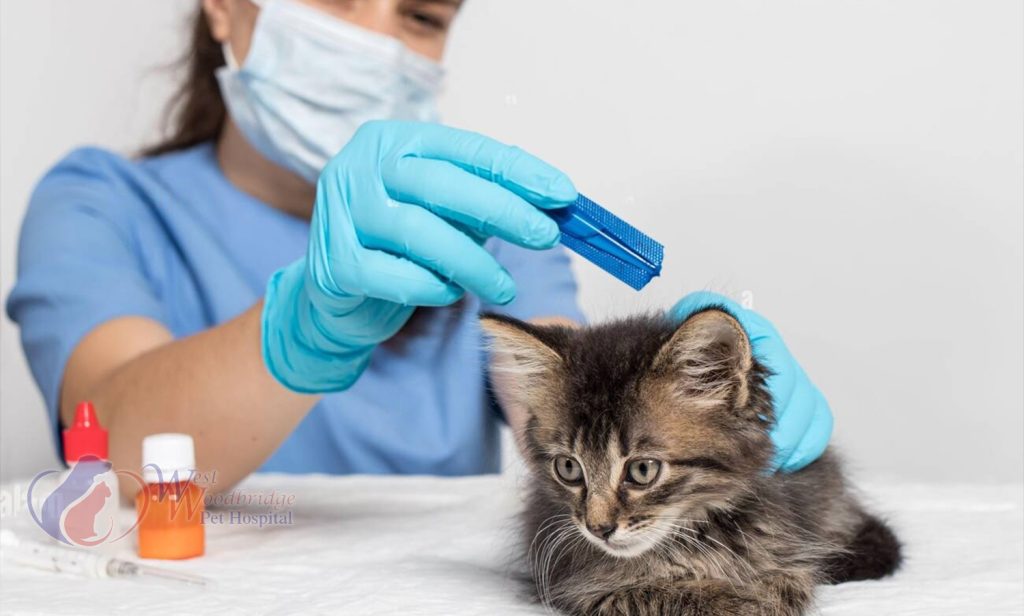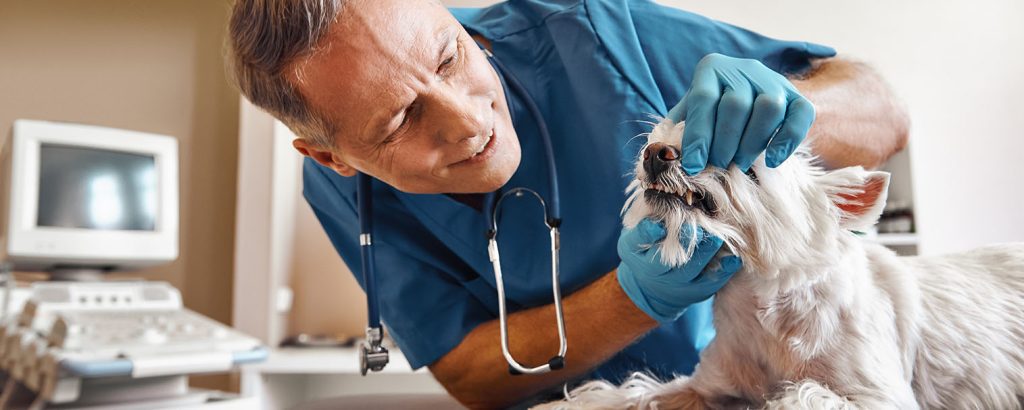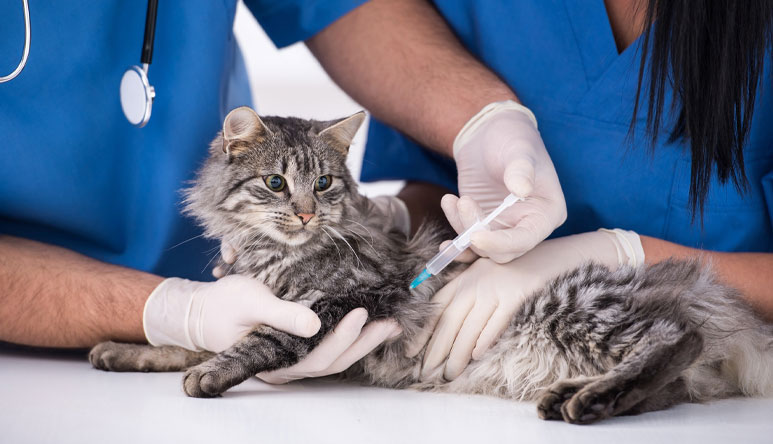
If your pet needs medical assistance, you can feel confident turning to us. Our knowledgeable staff and modern facilities are equipped to handle a wide variety of medical conditions, including emergencies. Because we can perform many diagnostic procedures in-house, we can often give you immediate answers and start treating your pet faster. In some cases, your pet may require hospitalization and further diagnostic tests. Please take a look at the more detailed descriptions of medical services we offer, or call us to discuss your pet’s needs.
Flea Prevention and Control
Fleas can cause problems for pets ranging from minor to life-threatening. Not only can these parasites cause severe itching, irritation, and allergies, but they can also transmit tapeworms and diseases. Fleas can infest dogs, cats, ferrets, mice, and rats. And fleas don’t just stay on pets; they can bite people, too. For more information, contact us or see the flea article in the Pet Health Library on our site.
You don’t want these blood-sucking parasites on your pet or in your home. We can help keep them away or help you get rid of them if they’ve already found their way inside. Call us to find out how to eliminate and control fleas or to start your pet on a preventive today.
Heartworm Prevention
When they bite, mosquitoes can transmit heartworm infection. And those heartworms can wreak havoc on your dog or cat. These parasites can severely and sometimes fatally damage the heart, lungs, and blood vessels. Some pets may not show any signs of infection; in those that do, symptoms can vary widely.
In dogs, signs of heartworm disease can range from coughing, fatigue, and weight loss to difficulty breathing and a swollen abdomen (caused by fluid accumulation from heart failure). Canine heartworm infection can also lead to a life-threatening complication called “caval syndrome” (a form of liver failure); without prompt surgical intervention, this condition usually causes death.
Although often thought to not be susceptible to heartworm infection, cats can indeed get heartworms. Cats can suffer from a syndrome referred to as heartworm-associated respiratory disease (HARD); the symptoms can be subtle and may mimic those of asthma or allergic bronchitis. Signs of respiratory distress, such as rapid or difficult breathing, wheezing, and panting, are common. Other symptoms include coughing, vomiting (typically unrelated to eating), and loss of appetite or weight. Heartworm infection is more difficult to diagnose in cats than it is in dogs.
Treatment for heartworm infection is far more expensive than prevention—and it can actually kill your dog. There is no approved treatment for cats. Some cats spontaneously rid themselves of the infection; others might not survive it. And even one or two adult heartworms in a cat can cause serious problems.
Fortunately, there’s an easy way to keep your dog or cat safe: by administering monthly heartworm preventives. Most heartworm medications also protect your pet against other parasites, such as roundworms, hookworms, whipworms, ear mites, fleas, and ticks. We can recommend the best regimen of prevention for your pet.
Tick Prevention
Ticks are becoming more and more prevalent in North America, and they’re now being found in areas where people and pets didn’t previously encounter ticks. These parasites aren’t just a nuisance; they can cause serious—and sometimes deadly—diseases, including Lyme disease, Rocky Mountain spotted fever, babesiosis, ehrlichiosis, and tick paralysis. Contact us immediately if your pet starts coughing or has joint pain, trouble breathing, fever, weakness, or loss of appetite, weight, energy, or coordination.
The best method for keeping ticks off your pet is by keeping your dog or cat on a tick preventive. Even indoor-only pets are at risk because ticks can hitch a ride inside on your clothing or shoes. Tick preventives are safe and highly effective at controlling ticks and the diseases they carry. Call us to get your pet protected today!
Don’t panic if you find a tick on your dog or cat, even if your pet is on a preventive. Some preventives kill ticks after they’ve come in contact with your pet. Ticks can hide easily under your pet’s fur, so as an added measure of protection, we recommend checking your pet for ticks every time your pet comes in from outside. And don’t hesitate to ask us any questions you might have.

Dentistry
Imagine what your mouth would feel like if you never brushed your teeth or went to the dentist. For many dogs and cats, this is a painful reality. According to the American Veterinary Dental Society, more than 80% of dogs and 70% of cats have dental disease by the age of 3. Dental (or periodontal) disease is the most frequently diagnosed health problem in pets.
Common signs of dental disease include:
- Yellow or brown buildup (tartar) on the teeth
- Red, swollen, or bleeding gums
- Bad breath
- Excessive drooling
- Changes in eating or chewing habits
- Pawing at the face
- Loose teeth
- Depression
Even if your dog or cat doesn’t have these symptoms, we recommend that you have a veterinarian evaluate your pet’s dental health at least once a year. Bacteria and food debris accumulate around the teeth and, if left unchecked, will lead to deterioration of the soft tissue and bone surrounding the teeth. This decay can result in irreversible periodontal disease, tooth loss, and possibly expensive oral surgery.
Dental disease can also affect other organs in the body: Bacteria in the mouth can get into the bloodstream and cause serious infections in the kidneys, liver, lungs, and heart. If these problems aren’t caught and treated quickly enough, they can result in death. A physical exam combined with appropriate laboratory work can determine if infection in the mouth has spread.
Schedule your pet’s dental exam today! We can also help show you how to brush your pet’s teeth and recommend foods and treats that will help combat plaque and tartar buildup.
Radiology (X-rays)
When we need to figure out what’s wrong with your pet, we routinely use x-rays to help identify the cause of the problem, rule out possible problems, or provide a list of possible causes. We may also use x-rays during a wellness exam to diagnose potential problems before they become serious.
X-rays provide valuable information about a pet’s bones, gastrointestinal tract (stomach, intestines, colon), respiratory tract (lungs), heart, and genitourinary system (bladder, prostate). We use radiology alone or in conjunction with other diagnostic tools. Interpretation of radiographs requires great skill on the part of the veterinarian.
We are proud to offer digital radiology (x-rays that are captured digitally rather than on film). This state-of-the-art technology allows us to provide you with a quicker diagnosis for your pet. Plus, it uses less radiation than traditional x-rays.
To avoid a blurry image, pets need to remain completely still while an x-ray is taken. In some cases, we may need to sedate your pet or use short-acting general anesthesia.
If you have any questions about our radiology service or what to expect during your pet’s procedure, please don’t hesitate to ask.
Medical Assessment
To ensure a proper diagnosis, we often need to examine your pet. We begin a medical assessment by looking at your pet’s eyes, ears, and skin and checking his or her cardiovascular, neurological, gastrointestinal, and skeletal systems for any abnormalities. We will perform blood and/or urine tests as necessary to check your pet’s kidneys, liver, pancreas, and endocrine system, including the thyroid and adrenal glands. Based on your pet’s condition, we may recommend further diagnostic tests, such as radiography (x-rays), endoscopy (internal scoping), ultrasound, or biopsy.
If you’re concerned that something may be wrong with your pet, please call us to schedule a medical assessment. Depending on the symptoms, we may ask you to bring in your pet right away.

27Sep
5 Reasons to Vaccinate Your Indoor Cats
1. Protects your pet If your cat is vaccinated, he/she is protected from a number of serious,
30Sep
7 Tips to Help Prevent Obesity in Your Cat
Many pet cats are overweight or obese. According a survey conducted in 2018 by the Association for
01Oct
The ROI of Educating Clients About Pet Insurance
Veterinary care and practice revenue represent a strange but important equation right now for
Any Emergency?